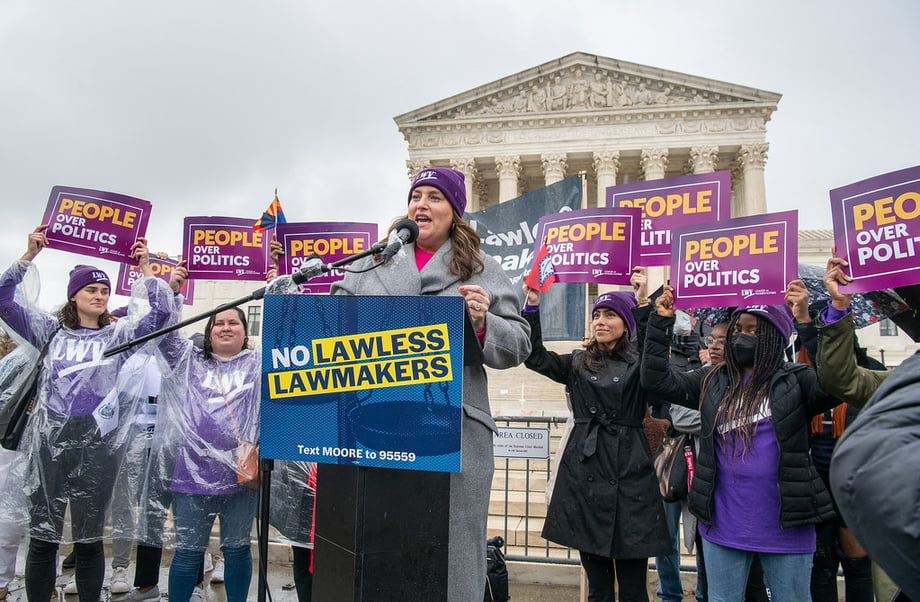On February 3, 2023, the North Carolina Supreme Court voted to re-hear Harper v. Hall, a case concerning redistricting. This decision earned national media attention, as Harper v. Hall is at the center of a US Supreme Court case (known as Moore v. Harper) concerning one of the most dangerous fringe theories threatening democracy today — the Independent State Legislature Theory (ISLT). The North Carolina Supreme Court’s upcoming decision could upend the case.
About Moore v. Harper
LWVUS and Leagues representing all 50 states and DC filed an amicus brief in Moore v. Harper last year.
The case began as a lawsuit in North Carolina state court challenging the new congressional map adopted in November 2021. Several North Carolina voters and advocacy organizations argued that the map was a partisan gerrymander that violated the state’s constitution’s free and equal elections clause.
,
Join our mailing list!
Keep up with our work in legal cases like Moore v. Harper.
,
In February 2022, in a 4-3 ruling, with all Democratic justices in the majority and all Republican justices in dissent, the North Carolina Supreme Court ruled the new map was a partisan gerrymander that violated the state constitution’s free and equal elections clause and barred its use for the 2022 elections. The trial court then adopted a new, expert-drawn map.
North Carolina legislators appealed to the United States Supreme Court, which agreed to hear the case. The legislators argued that the North Carolina Supreme Court’s decision to reject the legislature’s map overstepped its authority under the US Constitution’s Elections Clause. Via the fringe ISLT, they argued that the Elections Clause gives state legislatures exclusive authority to set rules for federal elections in their states without any limits from other branches of the state government, including state courts and governors. If the ISLT is adopted by the Supreme Court, state legislatures could gain near-absolute power to gerrymander Congressional districts, which could only be stopped by Congress, among other potential impacts.
Where is Moore v. Harper Now?
The Supreme Court heard oral arguments in Moore v. Harper on December 7, 2022. The League was there rallying outside the court, letting the justices know that we stand for checks and balances (and against ISLT).
,

,
On November 8, 2022, the political composition of the North Carolina Supreme Court flipped to a Republican majority. Three months later, the court voted to re-hear Harper v. Hall. Notably, nothing had changed in the case — no underlying facts or circumstances — only the court's composition.
On March 14, 2023, the North Carolina Supreme Court heard oral arguments in the re-hearing of Harper v. Hall. The US Supreme Court also ordered the parties in Moore v. Harper to submit briefs on whether the North Carolina Supreme Court’s decision to rehear Harper v. Hall affects its power to consider Moore v. Harper and the ISLT. On March 20, the parties submitted their briefs, which differed on whether the Court could still hear the case.
What Will Happen Next?
Under US Supreme Court precedent and federal law, the Court can only review final decisions from state supreme courts. Because the final decision in Moore v. Harper is being reconsidered, the Supreme Court could dismiss Moore without issuing a final decision on the ISLT because it no longer has jurisdiction. This would not mean the ISLT would go away. The theory is not new and could be considered by the Court again soon.
The US Supreme Court could wait until the North Carolina Supreme Court decides Harper v. Hall to take any action on Moore v. Harper. This could require additional briefing and another hearing before the Court.
The US Supreme Court could also issue a ruling in Moore and decide on the constitutionality of the ISLT regardless of what the North Carolina Supreme Court does. This would have nationwide impacts but would create a binding precedent on ISLT.
The League will be watching because no matter the outcome, the battle for democracy will continue to be fought at every level of the American government.